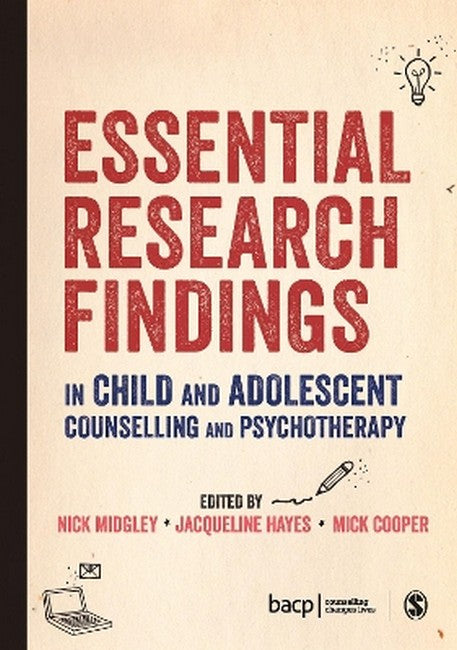Mick Cooper is Professor of Counselling Psychology at the University of Roehampton, where he is Director of the Centre for Research in Social and Psychological Transformation (CREST). Mick is a chartered psychologist, a UKCP registered psychotherapist, and a Fellow of the BACP. Mick is author and editor of a range of texts on person-centred, existential and relational approaches to therapy; including Working at Relational Depth in Counselling and Psychotherapy (2005, SAGE, with Dave Mearns), Pluralistic Counselling and Psychotherapy 2011, SAGE, with John McLeod) and Existential Therapies (2nd edn, 2017, SAGE). Mick has led a series of research studies exploring the processes and outcomes of humanistic counsel-ling with young people. Mick is the father of four children and lives in Brighton on the south coast of England.
Request Academic Copy
Please copy the ISBN for submitting review copy form
Description
Introduction: What can child therapists learn from research? - Nick Midgley, Jacqueline Hayes and Mick Cooper Epidemiology: Are mental health problems in children and young people really a big issue? - Ann Hagell and Barbara Maughan Neurobiology, attachment and trauma: The development of mental health problems in children and young people - Graham Music Therapy outcomes: Is child therapy effective? - Terry Hanley and Julia Noble Therapy outcomes: What works for whom? - Peter Fonagy, Liz Allison and Alana Ryan What leads to change? I. Common factors in child therapy - Jacqueline Hayes What leads to change? II. Therapeutic techniques and practices with children and young people - Jacqueline Hayes and Clare Brunst Conclusion - Nick Midgley, Jacqueline Hayes and Mick Cooper
This book is extremely well thought-out and is a must-have for those working with children and young people. -- Della Austin This book is the 'go-to' resource for all those involved in supporting young people. -- Andrew Reeves This is a ground breaking book for counsellors and psychotherapists working with children and young people. The contributors acknowledge the scepticism of many practitioners in relation to adopting an "evidence based approach" and each chapter is likely to provoke debate and discussion. For me the power of this book lies in the way the authors employ their own self-reflexivity to model an approach to evidence-based practice, and suggest ways their readers might set about finding and examining evidence themselves. Through reading this work, each of us may, indeed, become "research-invigorated". -- Professor Miranda Wolpert Essential Research Findings in Child and Adolescent Counselling and Psychotherapy makes an invaluable contribution to research-informed practice with younger clients. Written by some of the leading figures in the field, it provides practitioners with an authoritative and accessible overview of up-to-date scientific knowledge. -- John McLeod With contributions from a range of experts, the text offers specific therapeutic guidance for working effectively with children and young people with mental health problems, drawing on the latest research evidence. -- Panos Vostanis There are two strongly held narratives around today about what makes for a good counsellor or psychotherapist: the narrative of 'clinical experience' verses the narrative of 'research evidence'. This book skillfully brings these two narratives together into a coherent and complementary whole. It provides an engaging overview of research in the field of children and young peoples psychological therapies written by some of the world leaders in the field. It is not a book about research but more helpfully, it is a book about how to understand and use research evidence, to blend with clinical experience, to become a better therapist. It is one of the most accessible and comprehensive summaries of the research evidence that I have read - essential for all who are serious about their therapeutic practice. -- Duncan Law Essential Research Findings in Child and Adolescent Counselling and Psychotherapy is extremely important reading for child psychotherapists who are interested in the latest research, as well as for those who would like to be better informed but have tended to find the area of research daunting and arduous to digest. Rather than being purely about research, this book acts as a guide to understanding research evidence and how to use it to reflect on one's own practice to become a better therapist. I would strongly recommend this reading to all Child and Adolescent Psychotherapists -- Rebecca Woodhams This is a practitioner-friendly text that arms counsellors with knowledge on how their ways of working are, or can be, underpinned by research findings. -- Dr Ann Dalzell * Clinical consultant, psychotherapist and supervisor in private practice * I really enjoyed this book. I think it's well written, informative and interesting. It will appeal to students and experienced practitioners alike - we all need to participate in applying research findings to our practice and in becoming, as the editors suggest, 'research inspired'. -- Caroline Anstiss

